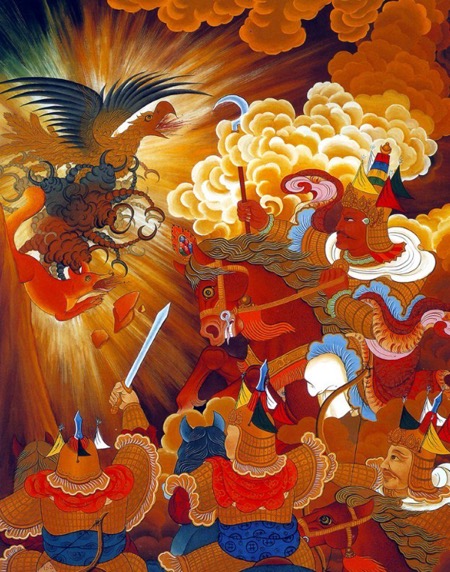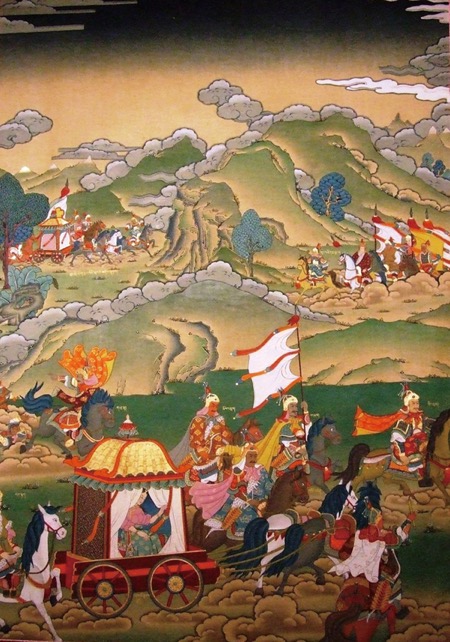Some call it "The Iliad of the East", but it is believed to be dozens of times longer than Homer's work. For centuries, folk artists in the snow-covered plateau of the Tibet autonomous region, Southwest China, traveled the region telling and singing stories of King Gesar. He was a legendary 11th century hero who fought evil and helped the weak. 
The epic of King Gesar is fading as an oral tradition, but Jampel Gyatso is determined to preserve it in text, as a "treasure of humanity". "It's the longest epic ever discovered in the world, with 1 million verses and 20 million words," said the retired doctoral supervisor with the Chinese Academy of Social Sciences. "But the value of a work is not determined by its length. Gesar is an encyclopedic masterpiece that reflects the social and cultural landscape of ancient Tibet." Over the past four decades, Jampel and his colleagues have traveled across China's vast Tibetan-inhabited areas. They interviewed folk artists while collecting, compiling and translating the epic tale. With Jampel as chief editor, a 40-volume, 16-million-word selected version of King Gesar was published in Tibetan in 2013. Now aged 81, Jampel still travels to the oxygen-deficient Qinghai-Tibet Plateau, continuing his research on the epic. His latest work, a five-volume Mandarin version of Hero Gesar was published last year. "There is still a long way to go," he said. "Hopefully more young people will join us translating the epic to let the Tibetan hero enter more people's hearts." Changing fate Born in Batang county, Garze Tibetan autonomous prefecture, Southwest China's Sichuan province, Jampel grew up listening to the stories of Gesar. Batang was located on the only route for the trade caravan to enter Tibet in the past. Therefore, Jampel had many chances to hear folk artists sing episodes of King Gesar for the caravan at night. The stories mesmerized young Jampel. He was fond of a story about horse racing where anyone, rich or poor, could claim the throne if they won the race. "The epic of Gesar does not advocate the hereditary system but the public mind, reflecting the expectations of the toiling masses," Jampel said. The folk artists, usually herdsmen and farmers, were struggling at the bottom of society. The singing of the epic was branded the "noise of beggars" by the nobility. "The study of Gesar first began overseas and the value of the epic was long overlooked in old Tibet," Jampel said. The founding of the People's Republic of China in 1949 changed the fate of King Gesar and the life of Jampel, who became a soldier in 1950. He followed the army to Tibet after the peaceful liberation of the region in 1951. In the army, Jampel learned Tibetan and Mandarin, and was sent to Southwest Minzu University in 1954. Jampel started his career as a translator in 1956. He worked on Tibetan versions of Marxist writing and continued such work for more than 24 years. During this period, China added the protection of King Gesar to its national agenda. In 1958, when preparing to mark the 10th anniversary of the founding of the PRC, the country initiated a project to search for and collect the epic in Tibetan areas. Jampel became the first Tibetan associate research fellow at CASS in 1981. It started four decades of dedication to the preservation and research of the epic tale. Stronger life

In the 1980s, China listed King Gesar as a national key research project. Across the country, researchers collected Gesar-related material, while looking for folk artists and carrying out academic studies. Compiling a selected version that presents a complete picture of the epic was a major goal of the researchers. But it was not easy. It was important to record the singing of the Gesar artists who were mostly in old age. Jampel and his team had to race against time, traveling around the Tibetan areas, interviewing folk artists, recording their storytelling and turning the oral art into a script. Jampel visited the renowned Tibetan Gesar singer Drakpa several times. Born into a serf family, Drakpa lost his father, two brothers, three sons and wife due to poverty, diseases and famine. As the value of the epic was rediscovered, artists like Drakpa began to be treated as treasures. Based on the recordings of Drakpa and other artists, Jampel and his team published the selected version of King Gesar in 2013. It had been 30 years in the making. The book series is the most comprehensive version of Gesar ever laid to print. Dreaming big Besides preserving the culture of Gesar, Jampel has been traveling around the world. He has given speeches and attended international conferences to spread the stories of Gesar. In 2009, the epic was added to the UNESCO world intangible cultural heritage list. "It's good to see that the value of our cultural masterpiece and our endeavor to protect it are winning worldwide acknowledgment," he said. "But there is still much to do." "Currently, only a small part of the epic has been translated into English," he said. "Hopefully more foreign language versions will be produced in the future." Making a blockbuster Hollywood-style Gesar film is one of Jampel's biggest dreams. "The story of Gesar can be turned into a great epic movie, just like the American movie Troy, which is based on The Iliad," he said. Working with other writers, he has finished a script. But there are challenges. "One problem is that Gesar is too invincible, so there is not enough conflict in the storyline to amuse the viewers," he said. "It is also hard to find an ideal actor to play Gesar. He has to be tall, strong and have certain understandings of Tibetan history and culture. No matter how hard it is, we will do our best to help the epic hit the big screen," he added.
|








7740f3b5-9ecb-438e-9052-76cb2d4bb671.jpg)

